VARDØ: While Norwegians make the most of their short summer, hardy citizens of this small island city up in Norway’s far northeast can’t claim to have any official summer days at all, statistically speaking. They’re used to looking for the light through clouds and darkness, though, as they ponder whether it will best shine in the form of oil and gas activity, a return to fishing, or birdwatching.
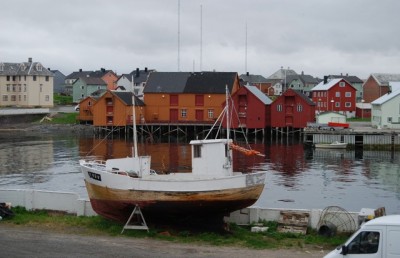
Vardø, located so far to the northeast that it’s actually east of Istanbul, is also so far north that it’s the only city on the European continent that sits in the Arctic climate zone. There are no trees here, in a country otherwise known for its enormous forests. “And we have zero summer days,” says deputy city manager Hallgeir Sørnes almost proudly, explaining that the average annual temperature in Vardø never rises above 10C (50F).
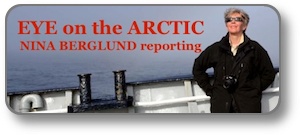 That hasn’t stopped state and local officials’ efforts to boost tourism, host festivals, attract even more birdwatchers and point proudly to their location along one of Norway’s new “National Tourist Routes.” The scenic two-lane E75 highway that runs right along the Varanger Fjord on its way to Vadsø and Vardø has been spruced up with architecturally acclaimed roadside rests, climaxing with an impressive memorial to arguably the darkest period of local history: The burning of alleged witches 400 years ago on a blustery Barents bluff at Steilneset, on the outskirts of town.
That hasn’t stopped state and local officials’ efforts to boost tourism, host festivals, attract even more birdwatchers and point proudly to their location along one of Norway’s new “National Tourist Routes.” The scenic two-lane E75 highway that runs right along the Varanger Fjord on its way to Vadsø and Vardø has been spruced up with architecturally acclaimed roadside rests, climaxing with an impressive memorial to arguably the darkest period of local history: The burning of alleged witches 400 years ago on a blustery Barents bluff at Steilneset, on the outskirts of town.
Picture story: Street art lives on in Arctic township
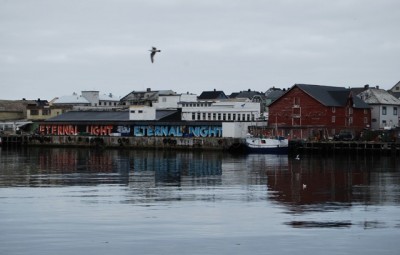
Vardø has faced other bleak periods in its long history as the oldest city in Northern Norway. Its citizens have weathered a harsh climate and lengthy winter darkness, been through wars and occupation, and adapted to changing fortunes. They’ve enjoyed unique economic dealings with the Russians through what’s known as the Pomor Trade, which made Vardø relatively affluent at one point, but its once-strong fishing industry has collapsed and the city’s population has fallen by half since 1960, to just 2,138 inhabitants as of early June.

“All the fisheries were in trouble, they couldn’t earn enough money to keep the factories going,” says Vardø Mayor Lasse Haughom, who retired from a military career and became the first mayor from the conservative Progress Party to be elected in Norway’s northernmost Finnmark County. Stocks of cod “are much better now,” Haughom notes, but most of the seafood processing operations have moved offshore to the trawlers themselves or to cheaper Asian countries.
Vardø nonetheless now seems to be on the verge of a better times. The state has helpfully relocated some important national agencies to Vardø as part of constant decentralization efforts, prompting Sørnes to note that Vardø now has “a high density of lawyers” because of all the government offices. Newly refurbished homes stand amidst abandoned ones, and a fancy new glass and wood Kulturhus (a civic center for culture and recreation) is rising next to City Hall complete with a swimming pool because “the Barents is too cold,” remarks Haughom.
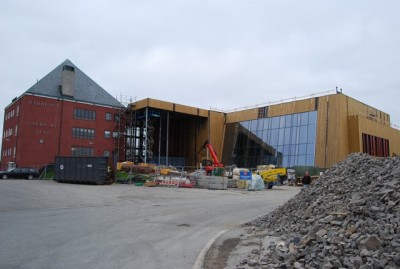
“It’s a very big investment (NOK 140 million) for Vardø town,” says the mayor, who helped push the project through, even though his Progress Party isn’t known for backing public funding for cultural activities. While the Progress Party in Oslo fought construction of the Opera House and, most recently, plans for a new Munch Museum, Haughom thinks the Kulturhus in Vardø is important and notes it “had a lot of political support.” Remi Strand, a lawyer who represents the rival Labour Party on the city council, agrees. He and Haughom seem to get along unusually well given the friction between the Progress Party and Labour most everywhere else in Norway.
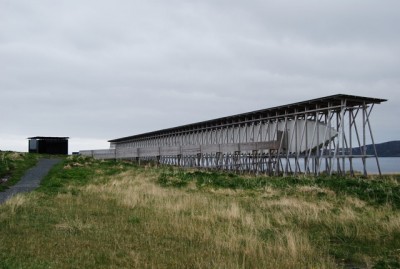
Vardø has seen a lot of other recent efforts at a civic facelift, from a street art festival last year to the opening of the Steilneset Memorial to the witch burnings and to the expansion of Vardø Radio, the main search and rescue base for the Barents region. And some transplanted Vardø residents “are coming back to their roots,” Haughom said, while relative newcomer Elisabeth Eikeland, commandant of the historic fortress in Vardø, claims she and her family are thriving. “I never want to leave,” says Eikeland, originally from Rogaland in southern Norway, and now an enthusiastic promoter of Vardø, happy to be responsible for its historic and important landmark and, on a personal note, smitten by the local great outdoors and opportunities for fishing for wild salmon.
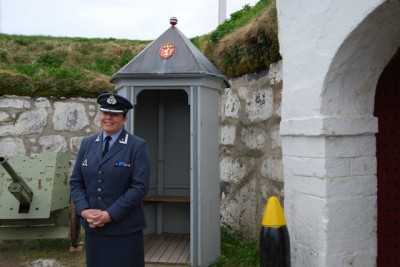
Lurking in the background, meanwhile, is the prospect of oil and gas exploration that’s been fueling new waves of economic optimism all over Northern Norway. In Vardø, though, the mood is decidedly more cautious about what effects oil and gas activity might have on the community.
One of the the large new oil and gas fields recently opened up for exploration by the state Oil & Energy Ministry is located just outside Vardø. An area on the other side of the tunnel to the mainland, at Svartnes, has already been zoned for oil-related operations like terminals, a supply base or offshore support businesses. “There aren’t any people living there, so they can have operations around the clock and not disturb anyone,” Sørnes says.
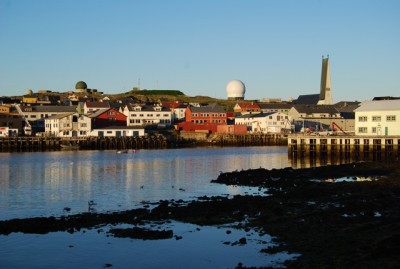
“A lot” of oil and gas companies are looking at Vardø, Sørnes adds, and Haughom will represent the city at the next big oil industry exhibition in Stavanger. In contrast to officials in other local governments in Northern Norway, though, neither they nor Strand seem too excited about the oil prospects and aren’t even sure they want oil and gas activity around town.
“We really don’t know what impact it will have,” Sørnes says. He thinks the oil companies will “bring their own people” to Vardø instead of hiring locally, at least in the beginning. “And we wonder ‘is this what we want for the next generations?'” Sørnes muses. He’s already worrying about what will happen if the oil and gas run out before it’s even discovered. Fish and birds are generally sustainable resources that don’t pollute, he notes, unlike oil and gas.
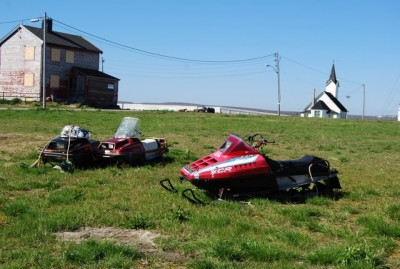
Haughom, a former Air Force officer and commander at the fortress who first came to Vardø in 1967, sees the potential for economic development from oil activity, not least for spin-off businesses, “but it’s the big oil companies who will decide whether the community really benefits,” he says, and he thinks that “if they find any oil and gas here,” its revenues “will all go to Oslo, and then be spread.” He thinks Vardø can be “an excellent site” for an oil company operation, at least as a back-up for Murmansk in Russia, “but I don’t expect too much.”
Nor do the Vardø officials expect much change after the next national election in September, even though Haughom may see his Progress Party finally attain government power. “We’re always going to struggle with Oslo,” he said. That brought a nod of assent from Strand, from the rival Labour Party that polls indicate is about to lose state government power. Haughom, Strand says, “is not a typical right-winger. He has a soul for Vardø.”
So seems Sørnes to have, concerned for the next generations and introducing reforms like consolidation of schools and day care centers that have put the revenues and costs of running Vardø “on the right side of each other.” He noted that “something had to be done” to brighten Vardø’s fortunes.
Much work remains, with Vardø’s unemployment rate of 7 percent still running at twice that of the national rate and six times higher than in Kirkenes across the fjord, which is benefitting from restarted mining operations and cross-border trade with Russia. Sørnes hopes “nature-based” tourism will be a growth industry, pointing to the birdwatchers who already come to Vardø because of its unique species and who are welcomed with specially designed shelters from which they can nurture their hobby. It’s not unusual to see foreign visitors at the local hotel sporting big cameras and even bigger binoculars.
As he showed a slide featuring Vardø’s motto, “The darkness must give way for the light,” Sørnes stressed a need for “social responsibility” no matter what path the officials take. Meanwhile, the city is gearing up for its annual Pomor Festival later this month, which celebrates Vardø’s historical trade with Russia, where “pomor” is a word used to describe coastal residents. “We had fish, they had flour and timber,” Sørnes said matter-of-factly. It illustrates the long experience Vardø and Finnmark County as a whole have had with foreign trade. Now they just have to decide what kind of new trade they want to pursue.
Views and News from Norway/Nina Berglund

